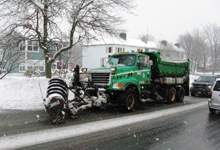Emergency Preparedness Tips

Snowstorms are a standard part of every Newfoundland winter, but there are many things residents can do in advance to ensure we are all prepared for snowstorms or any other kind of weather emergency.
“I think we have all learned a lot since Hurricane Igor struck in 2010 and the time to prepare for an emergency is long before it ever happens,” says Mayor Dennis O’Keefe. “While a snowstorm may be a regular occurrence during a Newfoundland and Labrador winter we must still remain vigilant and ensure we are prepared. The City does everything it can in advance to ensure we are prepared to deal with heavy snowfalls, but there are many things residents can do as well to ensure they are able to take care of themselves and their families.”
Some important tips for individuals to keep in mind before weather events include:
- Know the risks in your specific region;
- Follow local weather forecasts and watch for warnings and advisories;
-
Prepare and maintain an emergency kit – be ready to cope on your own for at least 72 hours, to allow first responders to help those in urgent need. Consider adding the following items to your kit for winter months:
- Snow shovels
- Sand to improve traction
- Rock salt or more environmentally safe products to melt ice on walkways and driveways
- Develop an emergency plan – keep in mind the specific requirements of any person in your household with a medical condition, mobility issues, or other special needs;
- Ensure your vehicle is prepared for the winter season in advance by having winter or good-quality all-season tires installed and that you have a full tank of gas before a weather event;
- Ensure you have easy access to snow shovels and/or snow blowers and that snow blowers are filled with gas in advance;
- Wood stoves and fireplaces should be inspected annually and have a CO detector installed;
- Test your smoke alarms to ensure they are working properly;
- Know where the main water valve shut-off is in case pipes freeze;
- Be aware of all local emergency numbers;
- Understand your insurance policy and potential coverage for fire and emergency situations;
- Ensure you have tied down or moved indoors anything you may have outside which could potentially be a hazard in high wind;
- Remove dead tree branches, which could pose a hazard or threat;
- Consider installing a hard-lined phone, as cordless phones will not work in a power outage;
- If you become aware of blocked culverts or malfunctioning traffic lights please contact Access St. John’s at 311 or 754-CITY (2489) to advise us of the situation;
- Emergencies that require assistance from Fire, Police or Ambulance should be directed to 911.
Some important tips for individuals to keep in mind during weather events include:
- Follow local weather forecasts and watch for warnings and advisories;
- If possible, stay indoors. If the power goes out stay warm by layering clothes that cover head, hands and feet;
- If the power goes out close off rooms not in use to conserve heat;
- Use flashlights, rather than candles and have a good supply of batteries. If you use candles, don't leave them unattended and keep them three feet from anything combustible;
- Keep an exit cleared throughout the storm, for emergency evacuation;
- Consider letting your faucets drip a little to keep pipes from freezing if the power goes out and outdoor temperatures have dropped;
- Never use gas ranges or propane heaters for indoor heating or cooking as they can lead to a dangerous buildup of carbon monoxide. Only use heating appliances approved for indoor use;
- Should you notice downed power lines in your area, do not touch or attempt to move them, but instead advise Newfoundland Power immediately at 737-2802;
- Be careful when shovelling. Vigorous exercise and cold temperatures can cause high blood pressure and accelerated heart rates;
- Drive only if it is absolutely necessary. Only use a vehicle if it is already equipped with proper winter tires and ensure you keep an emergency kit and shovel in your vehicle should you become stuck.
More information on personal preparedness can also be found at www.gov.nl.ca/fes or www.getprepared.ca.
For further information:
Jennifer Mills
Communications Officer
City of St. John’s
Phone: 709-570-2037
Cell: 709-690-7586
E-mail: jmills@stjohns.ca
Dennis O'Keefe
Mayor
City of St. John's
Phone: 709-576-8477
Cell: 709-685-5657
E-mail: dokeefe@stjohns.ca
